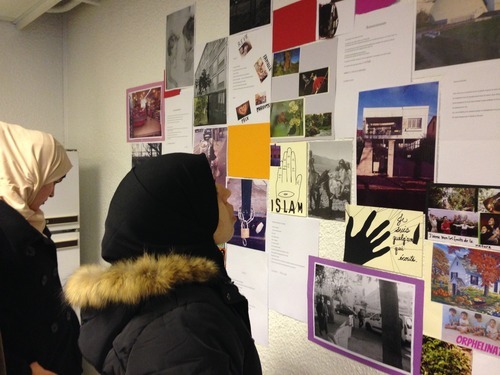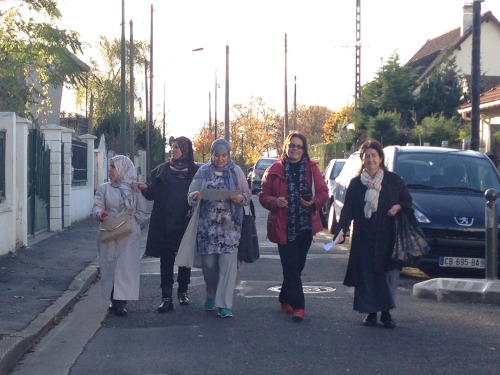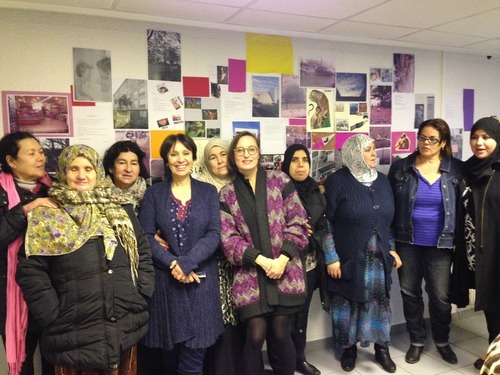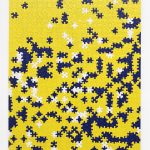FEATURED INTERVIEW FROM IAP NEWSLETTER: SARAH DOHRMANN
“There’s that sweet spot between what you are doing and what you think you could never actually do – somewhere in there is the work you are meant to do.”
Sarah Dohrmann, (Fellow in Nonfiction ‘09 and ArtistsAdvisory Committee) recently went to Paris through the support of a JeromeFoundation Travel and Study Grant, in order to research the final chapters ofher creative nonfiction book, titled Point of Departure. During her timethere, Sarah worked with a group of Maghrebi women immigrants (women fromAlgeria and Morocco); conducted a month-long poetry/collage/photo workshop at a
local NGO in Argenteuil (a commune northwest of central Paris), and interviewed
her students individually to research her book. We took the opportunity to find
out more from Sarah about her experience, what she learned, and what advice she
has for other artists traveling as part of their creative practice.
Can you tell us more about the inspiration for Point of Departure? Has your experience in Paris changed the direction of your writing? Were there any key moments or revelations you’d like to share?
Sarah Dohrmann: Point of Departure is a book of creative nonfiction that interweaves memoir with reportage and meta-fiction. It’s primarily about my time in Morocco, where I lived for 15 months in 2007-2008, and again for three and a half months in the spring of 2011. My experience of living in Morocco, and in particular of getting to know women in prostitution there, is interwoven with recollections of my mother’s suicide when I was a girl.
I went to Paris in the fall of 2014 on a Jerome Foundation Travel and Study Grant in Literature to inform a strand of meta-fiction in my book, which is based on a woman who works as a prostitute in Morocco, and who I imagine immigrates to France to start a new life, as many women I met in Morocco dreamed of one day doing.
Spending time with and interviewing Maghrebi women was incredibly elucidating for my work. I knew before going that French immigration isn’t easy for anyone in the slightest; they have an international reputation for Kafka-esque bureaucracy. But being there allowed me to interview key stakeholders in women refugees’ immigration in particular, to talk about sex workers’ lives in Paris, and to study the administrative logistics as they relate directly to women from Algeria or Morocco—the finer differences in immigration experiences, based on the date of immigration and country of origin. But most importantly, the women I interviewed and spent time with helped me to have a sensory experience of the lives of women who live on the periphery of Paris, even if it was for a short time. And it’s this sensory experience that is the bedrock of any creative work. Small, certain mannerisms and characteristics of women I got to know will no doubt appear in the book, as will some of the stories they generously shared with me.

In the time spent developing relationships with your group of women from the Maghreb, what were your expectations for that experience and were there any surprises? Was your experience of teaching in Argenteuil different from here in the US, if so, what was your main takeaway?
SD: I honestly don’t go in with expectations. Each individual is unique. Though I do admittedly go in with a hope that I’ll be able to have a true connection with someone, and that, after some time, I’ll be able to gain trust. It requires time, sure, but mostly it requires your wholehearted self. It requires acknowledging your own vulnerability. It’s extremely difficult to walk into others’ lives and ask hard questions. What the women I’ve interviewed have done to survive is extraordinary. I’m always struck by how much one’s basic personality affects one’s life’s path, no matter the daunting circumstances that often prevail. I have never done more self-evaluation and deep soul searching more than I have before and after I conduct an in-depth interview with someone I don’t know, but whose stories I want to understand, and whose stories I believe are important to be understood.
I bartended and waited tables for years in New York, and I’ve taught writing to children and teens in New York City schools—sometimes the students will take one look at me and aren’t shy to tell me that I’m wasting my time. Through all of these experiences, I’ve learned time and again that every person has a story they want to tell, even if it’s a story they’ve never had the courage to tell before. Sometimes people see me as an opportunity to tell their secrets. And that’s always the surprising part, the part where you find yourself on the receiving end of a story that has thus far gone unuttered. Some of the women I interviewed in Paris talked to me like it was their last chance to say what they really thought about their husbands, about France, about Paris, about their home countries, about their fathers or mothers or sisters, about some of the shameful things they’d done or sacrificed in order to start their lives anew. You have to be present, listen closely, and careful not to interrupt in order to allow for uncomfortable silences that sometimes successfully breach the social niceties—into unchartered space where something real is before you both.
Of course it helps to want to understand others’ lives and to find the connections all of us have, no matter where you’re from. I would say that I was surprised at how open and loving the women I spent time with in Paris were with me, but I’ve spent enough time in Morocco to know that the hospitality and warmth of North Africa goes unparalleled. Maghrebi people have taught me a lot about how to share and how to open and how to accept—they’ve taught me grace. And it helped, I think, that I don’t speak perfect French. That was a surprise! Normally in Paris I’m terrified to screw up my verb conjugations, but a lot of the women I spent time with aren’t perfect at French, either, so we were able to bond over our shared frustration with the language. And there’s something magical that happens when you’re struggling with a language; you listen more closely, you work to make sure you understood the other correctly, and you’re not afraid to ask for clarification—and when you do, people really go to the heart of what it is they mean to say. And if all else failed in interviewing women, I’d stumble through Moroccan Arabic with them, which is a language I used to be able to speak far, far better than I do now.
I have led creative writing workshops as a writer in New York City schools for Teachers & Writers Collaborative since 2001; I’ve also taught adults in community sites, at Gotham Writers’ Workshop, and at Sarah Lawrence College. And, I’ve taught poetry/collage/photography workshops to sex workers and single mothers in various women’s associations throughout Morocco. Those who take classes at Gotham or at Sarah Lawrence know they want to write; the people I’ve taught in the schools and in Morocco or on the outskirts of Paris don’t—I suddenly show up one day and they’re like, “You want us to wha???” Some of the people I’ve taught in the schools are reading well below grade average, and in Morocco and in Paris some of the women’t weren’t literate, so you have to find ways to bring in poems to study and to use as a springboards for writing that will feel safe to a wide variety of learners. Using multiple modes like collage and photo help with that. And, of course the differences in Morocco and Paris from the U.S. were language-based—in the U.S. I teach in English, in Paris I taught in French, and in Morocco I taught in Arabic. (Yikes.)

How did you prepare for taking substantial time away from your home base of New York City? Were there any challenges you encountered along the way and what might you do differently in the future? Based on your recent experience, do you have any advice for artists who are considering traveling overseas?
SD: Fifteen months in Morocco, followed by another three and a half months in Morocco, six weeks of research into the second-wave feminist movement in Iowa, as well as occasional artists’ residencies in different parts of the United States, prepared me for the consequences of picking up my life and moving it to another, far-away place, knowing that I’d have to find a way to reenter my life in New York when I got back. I find it tremendously difficult, and each time I come back, I ask myself if going away was really worth it, since coming back is so hard, especially financially. The older I get, the more I want stability in my life, and yet I keep going away to do these big projects. I do think the grants mean something: I am learning a huge amount, my work is diversifying in ways I never could have predicted, and having received grants in the past shows subsequent funders that I’m a person they can give money to.
I live in a rent-stabilized apartment, but this time around, when I sublet it, my landlord sued me for eviction, so I came back to a housing court crisis. Everything has been resolved now, but it has been extremely stressful and costly, and it does make me afraid for the next time that I’ll go away, which of course I will—because at this point I’ve accepted that it’s not just a passing fancy, that this is the work that I do. My advice would be to make sure you have at least two months’ living expenses saved, as well as jobs lined up for when you get back; that you stay in touch with people in New York via social media or email or phone while you’re away so that you don’t seem really “gone;” and that you’ve realistically foreseen the time it will take not only to complete your creative work once you’re stateside again, but also the time and patience it takes to reenter into New York City life.
You were successful in receiving the support of the Jerome Foundation for your travel and study time in Paris. Do you have any advice for literary artists and artists in general about raising funds to support their practice? Has this been a long process and did you have to find other means to support your time away?
SD: I have been really lucky with grants and fellowships. Of course, I apply for about five times the number of them than I actually receive, but I guess that’s par for the course. I would say don’t stop applying. And when applying for grants for specific projects that require travel, it’s important to have letters of support from the people in the other location whom you intend to spend time with; in the case of my grant to Paris, I contacted numerous feminist and women’s associations in Paris who work with refugee women months in advance. This not only helped me to get the grant, but it helped me to hit the ground running when I arrived. If your proposal doesn’t succeed, ask for feedback from the funder to see how you might improve your application the next time you apply, read the grantees’ project descriptions who did get the grant, follow up on their work—this all helps you to better understand what the funder is looking for.
I’d also say: Don’t contort yourself or your work into such a position that you could never reasonably achieve what you’ve said you would do, and don’t propose a project that you don’t actually want to do, no matter how good it sounds. It’s important to use the opportunity to fine-tune the work that you are actually doing, instead of making up some fancy story that not even you believe. At the same time, to stretch your practice into realms that feel out of reach is a wonderful thing—it means you’re alive, it means you’re really working. There’s that sweet spot between what you are doing and what you think you could never actually do—somewhere in there is the work you are meant to do.
My other means of support have been paltry, I’m not going to lie. I am poor. I somehow manage to support myself with teaching, publishing essays, freelance journalism, freelance copy editing, communications work for organizations, private tutoring… I am basically your Class A scrapper. But these jobs allow me the flexibility I need to go away if I have to, and no matter what, I am waking up early in the morning to get my writing time in, to do the work I have to do in order to make all this nonsense make sense. But even so, this way of living is becoming more challenging with each passing year. It’s the kind of thing that looks a lot better on paper than it actually is—going away to Paris for three months to work on your book. I needed six or more months to make that work what I know it can be, which is why I’ve since applied for another fellowship to go back. Sometimes I think I must be insane. It used to all be OK when I was younger, but now I’m 42 and it’s scary as hell.
I had a friend of mine in his 70s, whose work was collected by MoMA and the Guggenheim in the 80s, who slept on my couch for days because he couldn’t live at the Y anymore after he’d been evicted from his home of 20-odd years. He had the clothes on his back and a plastic sack of extra underwear, and that was it. He’d made money once, he’d had a good teaching job, he was once an artist of note, but he never saved a dime. I joked at the time that I had a cautionary tale crashing on my couch. But at the rate I’m going, I’ll be that guy in thirty years, and without the major recognition that he received, and maybe not even half the talent! It’s scary. It’s really scary. Writers are barely paid for their work, though some publications do pay. I’ve learned (too late) to be savvy about where I send my work, and to ask for a higher fee than the one they initially offer. I saved a bunch of money this last go-round for after I returned from Paris, but then I got screwed because I had to give it all to a lawyer to help me fight for my apartment. It’s time I sell my first book.
When my friend was on my couch, I kept asking him who his network was. Where was his network? How was it that I, a person 30 years younger than him whom he met only recently for a couple of months at an artists’ colony, was his only go-to person for crashing when in an extreme time of need? I was happy to do it, but it seemed ridiculous. You know what he said? He said he put too much energy into women. That’s what he said!
So the moral of the story here is that you have to build a network, a real network in which you give back to others, you become a solid part of the literary or arts community in a way that feels real and wholehearted. It’s not enough to have powerful acquaintances or to be a social-media maven. You have to build true and lasting connection in your life, not just work all of the time and chase tail. Jesus. I must be really projecting here. I’ve wasted a lot of time on both.
To learn more about Sarah’s writings, visit her website. Sarah is publishing an essay every Tuesday of 2015 on her blog, Today’s Tuesday. Sarah will be moderating discussions at Face to Place Literary Salon, Wednesday, March 18, 6:30 – 8:30 PM. Click here to RSVP.
_Sarah has been a Fulbright fellow (Morocco), a NYFA fellow in the category of nonfiction literature, a two-time Jerome Foundation Travel and Study grantee and a Lower Manhattan Cultural Council Workspace writer in residence. Sarah received the 2015 Sarah Verdone Writing Award and was co-recipient, with photographer Tiana Markova-Gold, of the 2010 Dorothea Lange-Paul Taylor Prize from the Center for Documentary Studies at Duke University for their joint project on women and prostitution in Morocco; their collaboration, which includes a long-form essay by Dohrmann and images by Markova-Gold, is forthcoming in Harper’s Magazine. Sarah’s essay about North African women living on the periphery of Paris is forthcoming in n+1 magazine. Sarah’s work has appeared in New York online, The Iowa Review, TIME LightBox, Some Call It Ballin’, LUMINA Journal, Joyland Magazine and Teachers & Writers Magazine, among others. Sarah serves on NYFA’s Artists Advisory Committee representing nonfiction literature. _
This interview was featured in Issue No. 67 of the Con Edison Immigrant Artist Newsletter. Are you currently receiving this free newsletter? Sign up to receive the monthly email featuring artist interviews, special reports, and upcoming arts deadlines and professional development resources.
Images, from top: Some members of ATMF-Argenteuil’s “espace des femmes” or “women’s space” pose in front of the artwork they made in Sarah Dohrmann’s “Ma Vie, Mon Parcours” (“My Life, My Journey”) creative workshop; Two women take a close look at participants’ artwork; Some participants of Sarah Dohrmann’s “Ma Vie, Mon Parcours” workshop.





